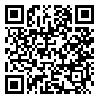Volume 16, Issue 2 (2016)
MJEE 2016, 16(2): 62-71 |
Back to browse issues page
Download citation:
BibTeX | RIS | EndNote | Medlars | ProCite | Reference Manager | RefWorks
Send citation to:



BibTeX | RIS | EndNote | Medlars | ProCite | Reference Manager | RefWorks
Send citation to:
Shafieinejad A, Hendessi F. Analysis of Inter-flow Network Coding in Lossy Wireless Networks. MJEE 2016; 16 (2) :62-71
URL: http://mjee.modares.ac.ir/article-17-5072-en.html
URL: http://mjee.modares.ac.ir/article-17-5072-en.html
1- Department of Electrical and Computer Engineering, Tarbiat-Modares University, Tehran, Iran
2- Department of Electrical and Computer Engineering, Isfahan University of Technology, Isfahan, Iran
2- Department of Electrical and Computer Engineering, Isfahan University of Technology, Isfahan, Iran
Abstract: (3813 Views)
This paper addresses the problem of inter-flow network coding for unicast sessions in lossy channel wireless networks. In spite of decreasing the number of transmissions, network coding intuitively increases the sensitivity of nodes to lost packets. First of all, coded packets carry more information than native packets and thus losing a coded packet prohibits a series of dependent nodes from decoding their intended packets. Secondly, for the scheme with opportunistic listening, it is necessary for some of the nodes to overhear the transmission of their neighbors. Thus, successful decoding requires overhearing of the corresponding packet(s) in addition to correct reception of unicast and broadcast transmissions.
In this paper, we study the effect of lossy channel on the aggregate network throughput in the presence of network coding. We provided a linear programming formulation to compute the throughput performance of network coding for a general lossy wireless network. Further, we consider a retransmission mechanism for both unicast and broadcast. Our LP system supports both COPE and Star coding schemes. The advantages of the proposed NC schemes over the non-NC ones are shown through simulations and theoretical analysis. Results show that network coding can boost the capacity of wireless network up to 40% under lossy channel condition.
Received: 2017/06/6 | Accepted: 2016/06/1 | Published: 2017/11/14
| Rights and permissions | |
 |
This work is licensed under a Creative Commons Attribution-NonCommercial 4.0 International License. |







